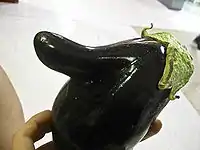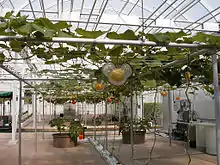
Unusually shaped fruits and vegetables have shapes that are not in line with their normal body plans. While some examples are just oddly shaped, others are heralded for their amusing appearance, often because they resemble a body part such as the buttocks or genitalia. Pareidolia, the tendency to mistakenly see a face in an object or visual, can be common in vegetables, with some people reporting the appearance of religious imagery.
Causes
Vegetables usually grow into an unusual shape due to environmental conditions. Damage to one part of the vegetable can cause the growth to slow in that area while the rest grows at the normal rate. When a root vegetable is growing and the tip is damaged, it can sometimes split, forming multiple roots attached at one point. If a plant is in the primordium (embryonic development) stage, damage to the growing vegetable can cause more extreme mutations.[1]

The unusual shape can also be forced upon the vegetable. In Japan, farmers of the Zentsuji region found a way to grow square watermelons by growing the fruits in glass boxes and letting them naturally assume the shape of the receptacle. The square-shaped watermelon was intended to make the melons easier to stack and store, but because the melons must be picked before they are ripe they are inedible; the cubic watermelons are also often more than double the price of normal watermelons.[2] Using similar techniques, growers have also created more complex shapes of watermelon, including dice, pyramids, and faces.[3]
Root vegetables, especially those such as carrots and parsnips, will naturally grow around or avoid obstacles in the soil such as small stones and other foreign objects to prevent damage to the developing root, resulting in a wide variety of different shapes.[4]
Legislation
In the European Union, attempts to introduce legislation prohibiting the sale of misshapen fruit and vegetables were defeated. The proposed "uniform standardisation parameters" would have applied to straight bananas and curved cucumbers, as well as to more extreme cases such as carrots with multiple "legs", or fused fruit. The main concern for opponents of the proposed legislation was the ethical question of the wastage it would have generated if growers were forced to discard up to 20% of their crop, produce that was nutritionally identical to more regularly shaped specimens.[5]
Changing consumer behaviour
As of 2015, around 40% of commercially-grown fruits and vegetables are not eaten as they do not meet retailers' cosmetic standards.[6] In France, the Fruits et légumes moches campaign aims to encourage the purchase of more unusually shaped vegetables and fruits to combat food waste.[7]
A similar campaign, "Frutta Brutta", was started in Milan, Italy. [8] Multiple startups in the US have also been formed to sell and repurpose surplus and oddly shaped produce. [9][10][11]
Competitions
It is common in some countries to celebrate the diversity of vegetable shapes, with particularly unusual items being entered into competitions. Many of these are judged by the ugliness of the vegetable.[12] Some organisations run contests in which gardeners enter the largest vegetables that they have grown.[13][14]
In popular culture
The popular BBC television program That's Life! mixed investigative journalism with more lighthearted sections, which included items on unusually shaped vegetables.[15]
The BBC comedy television program Blackadder contains several jokes relating to the character Baldrick and his obsession with odd-shaped turnips. The most notable example occurs in the episode "Beer", in which Baldrick discovers a turnip shaped like a "thingy," giving rise to several jokes throughout the episode.
Gallery
 "Twin" tomatoes
"Twin" tomatoes "Twin" courgette/zucchini
"Twin" courgette/zucchini A strawberry "man"
A strawberry "man"_s_izraslinom.JPG.webp) An unusually shaped cherry
An unusually shaped cherry Entwined carrots
Entwined carrots.jpg.webp)
See also
References
- ↑ Plant Answers. "Why are some of my vegetables growing into such odd and unusual shapes?". Retrieved 5 June 2007.
- ↑ BBC News. 15 June 2001. "Square fruit stuns Japanese shoppers". Retrieved 5 June 2007.
- ↑ "Funny Shaped Japanese Watermelons". Archived from the original on 2012-06-07. Retrieved 12 July 2007.
{{cite web}}: CS1 maint: unfit URL (link) - ↑ "Hints From Heloise: Hairy strings a carrot thing?". The Washington Post. Retrieved 29 March 2018.
- ↑ "Wonky fruit to stay on sale in EU". BBC News. 25 March 2010.
- ↑ Squires, Wendy (9 April 2015). "Inglorious fruit and veg: We're so aware of looks we won't even eat ugly food". The Sydney Morning Herald. Retrieved 29 June 2019.
- ↑ "Fruits et légumes moches: moins chers et désormais disponibles partout". L'Express (in French). 16 October 2014. Retrieved 25 March 2018.
- ↑ "Milan leads fight against food waste – with ugly fruit and Michelin-starred soup kitchens". TheGuardian.com. 16 October 2016.
- ↑ "OkCupid for unwanted fruits and veg: Tech joins the fight against food waste". TheGuardian.com. 31 May 2016.
- ↑ "Ugly fruit and veggies are making a comeback on US grocery shelves". TheGuardian.com. 2 April 2016.
- ↑ "The Time is Ripe for Ugly Fruits and Vegetables". Forbes.
- ↑ Cornwall County Council. 16 September 2005. "Giant Vegetable Competition and Show at Kehelland Horticultural Centre". Retrieved 22 October 2010.
- ↑ Cheung, Maxine. The Toronto Observer. "Stouffville grower squashes the competition at the Royal Winter Fair Archived 2007-10-09 at the Wayback Machine". Retrieved 5 June 2007.
- ↑ "Giant vegetable showdown sees 4 world records broken". Guinness World Records. 2021-10-08. Retrieved 2023-08-17.
- ↑ "Rantzen's years in the limelight". BBC. 16 June 2006. Retrieved 29 August 2013.
External links
- Love Carrots and Other Vegetables - "A sporadic photographic journal of weird or humorous vegetables".
- The Mutato Collection - "A collection of non-standard fruits, roots and vegetables".
- MoFa-Museum of Food Anomalies - "An online exhibition of the Art of Regular Food Gone Horribly Wrong."
- "Attempt at EU-wide 'wonky fruit and veg' ban fails."